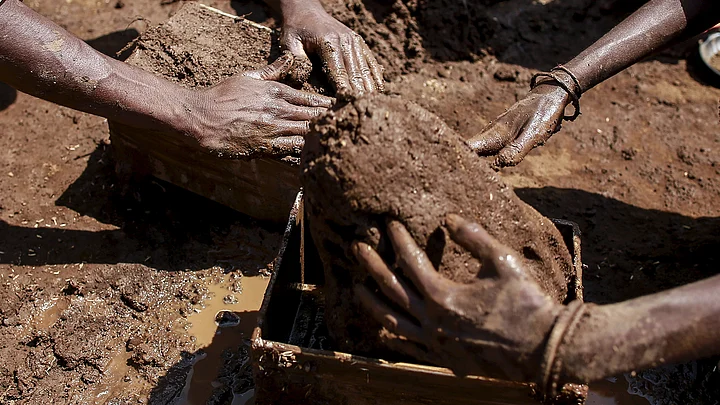Thousands of brick kiln workers in Maharashtra are learning from activists that they have the right to a minimum wage, basic amenities and fair treatment – but remain in debt bondage to owners who deny them these rights with impunity.
The workers are largely landless Adivasi tribals who are forced to work at the kilns for half the year to pay off their debt. Entire families may work up to 14 hours a day for low or no wages, few amenities, no days off, and with no idea of how much money they still owe, activists said.
The government, the police think bonded labour is when someone is tied up in chains or locked inside a room. They don’t even acknowledge that these workers are bonded. We tell the workers they have a right to be paid, to not be beaten or abused, to have time off, to send their kids to school.Ashok Jangale, director, Disha Kendra
India is home to almost half the world’s 36 million slaves,
according to the 2015 Global Slavery Index compiled by the Australia-based Walk
Free Foundation.
Kilns Are Illegal, so Keeping Track Is Difficult
Many Indians are duped into offering to work in farms, brothels and small businesses as security against a loan they have taken or a debt they have inherited. This is especially common in the construction industry, particularly in the unregulated sectors of brick making and stone quarrying.
The kilns themselves are mostly illegal, so keeping track of them is hard and they keep no records. There’s a lot of trafficking and bonded labour in the industry, but it is a profitable business and owners are usually politically connected, so the authorities turn a blind eye.Chandan Kumar, ActionAid’s national coordinator, Bonded Labour Eradication Programme
There are no official figures on the number of people
employed to cut, shape and bake clay-fired bricks, mostly by hand, in tens of
thousands of brick kilns in India.
Most of the workers are illiterate, keep no records, are paid a pittance and do not know how long it will take to pay off their debt. Some take out extra loans, for festivals and weddings, even while repaying the original one.
According to data compiled by the Centre for Science and Environment, at least 10 million people work in kilns, many located on the edge of towns and cities.
Vigilance Panel in 2012 After Death of Workers
At a kiln off the main road in Vanjarwadi village in Karjat, about 60 km from Mumbai, Ganesh Mukund said he had borrowed about Rs 50,000 from the owner and did not know how much he still owed. He said he had previously worked in a kiln where a worker was beaten so badly that his arm was broken.
When we hear about such instances, we investigate the matter and file a case with the police. There may be up to five such cases a year, and there have even been instances of workers being killed. Although the police often put pressure on the workers to settle for some money, we tell the workers to persist.Ashok Jangale, Director, Disha Kendra
The state government appointed a vigilance committee in 2012
to check bonded labour after the deaths of several workers. A spokesman for the
state’s labour department said it was still keeping watch for alleged cases of
bonded labour.
Literacy Allows Workers to Keep Their Own Logs
Earlier this month, 564 brick kiln workers were rescued in southern Tamil Nadu state in one of the largest such operations in the country.
In Fansawadi village in Karjat, Rama Bai takes a break from shaping bricks to show an officer from Disha Kendra a small ruled notebook. It has daily logs since December, when the working season began, of the number of bricks her family made every day.
Rama Bai borrowed Rs 60,000 for her daughter’s wedding three years ago, and a further Rs 15,000 for festivals, and agreed to work at the kiln to pay it off.
She, her husband and their two sons have worked at the kiln during the December-May dry season for three years, making about 1,000 bricks a day – the quota set by the kiln owner. They do not know how much longer they will have to work there.
We have trained her son, who is literate, to keep a log and check the owner’s log. We tell them not to borrow so much money for festivals and weddings: they should know what is trapping them. And that when they have paid off what they owe, they have a right to leave.Ashok Jangale, Director, Disha Kendra
